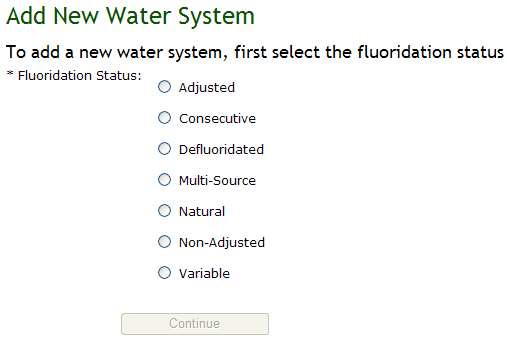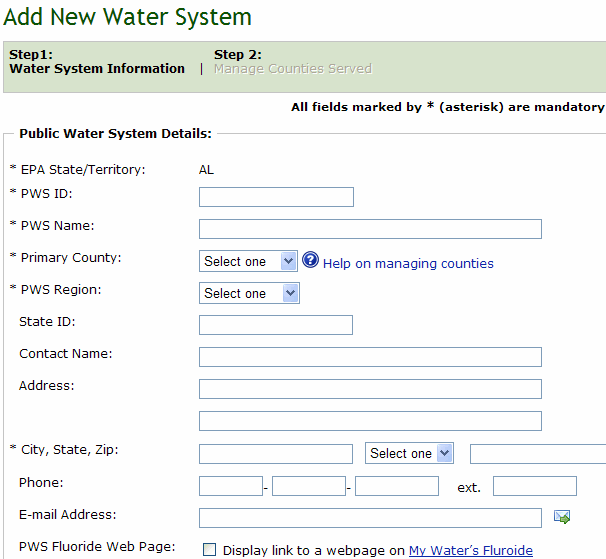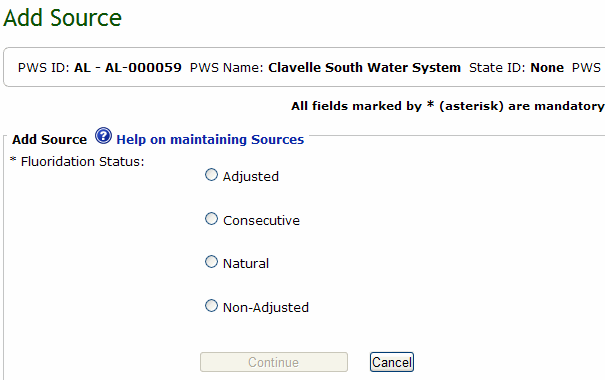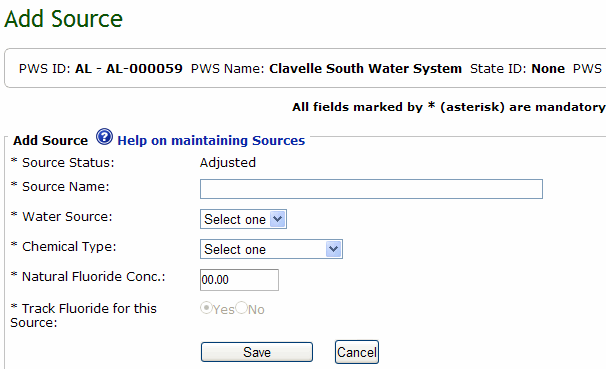Access the Water Systems list page and click on
the Add New Water System link
at the top of the page. The system displays the fields for selecting a
fluoridation status.

Select the fluoridation status for the new water
system that you want to add, i.e. adjusted, fluoridated, etc. The system
enables the Continue button.
Note: The fluoridation status selected here will determine the
fields displayed in the fields for adding the PWS.
Click Continue.
The system displays the fields for entering the details for the new PWS.

For the Public Water System Details section, complete the fields
as described in the table below.
|
Field |
Description/Instructions/Notes |
|
Public Water System Details |
|
|
EPA State/Territory |
The system pre-populates this field with the owner's state or territory information. Note: For a tribal system, the system displays a list of surrounding EPA states associated with the tribal owner. |
|
PWS ID |
Enter the ID of the new PWS system. This name must be unique and cannot be identical with the name of an existing water system. If you enter the PWS ID for an inactive system, the system gives you the option to activate it using a list of inactive water systems. |
|
PWS Name |
Enter the name of the water system. |
|
Primary county |
Select from the list of counties associated with the owner state. |
|
PWS Region |
Select the region for the new system from the list of regions. The system displays a list of regions to which you are assigned depending on your access level. For example, if you have been given access to only a specific region, the system displays only that region. |
|
State ID |
Enter the state ID of the water system, if available. This field is optional and may not display as it is not used by all owners. |
|
Contact Name |
Enter the name of the person to contact regarding the new PWS. |
|
Address |
Enter the full address, i.e. street, city, state, and ZIP code of the contact name. |
|
Phone |
Enter the telephone number for the PWS. Enter the extension if available. |
|
E-mail Address |
Enter the e-mail address associated with the new PWS. |
|
PWS Fluoride Web Page |
Enter the website for the water system. Select the check box if you want the PWS web page displayed in My Water Fluoride. |
|
Memo |
Enter any other important information associated with the PWS. |
|
Fluoridation Details |
|
|
Fluoridated |
The value displayed in this field is determined by the option selected in the Fluoridation Status field. This field is populated as follows: The system displays Yes if:
The system displays No if:
|
|
Fluoridation Status |
This field displays the fluoridation status selected earlier in the process. |
|
Water Source |
Select the water source from the list. Note: If the PWS has a Consecutive fluoridation status, the system populates this field with the name of the Parent water system. If the Fluoridation Status is Consecutive, the system populates this field with the word "Parents". This field is not displayed if the fluoridation status is Multi source. |
|
Last Inspection |
Enter the last inspection date or use the calendar icon to select the date. Note: This field is visible only if the fluoridation is Adjusted, Defluoridated, or Multi-source. You can also use the system to track and schedule future inspections. CDC recommends that all fluoridating water systems be inspected annually. |
|
System Type |
Select the system type for the new PWS, e.g. Military, Native American, etc. |
|
Last Fluoride Training |
Enter the date that an operator from the PWS received fluoride training or use the calendar icon to select the date. Note: This field is visible only if the fluoridation status is Adjusted, Defluoridated, or Multi-source. CDC recommends that an operator from each fluoridating water system receive at least 6 hours of fluoridation specific training each year. |
|
Chemical Type |
Select the source of chemical for the fluoride, e.g. NaF, Natural, Parent, etc. Select the appropriate chemical type from the Fluoridation Status drop down list. Note: If the PWS has a Natural or Non-Adjusted fluoridation status, the system populates this field with Natural. If the PWS has a Consecutive fluoridation status, the system populates this field with the value from the Parent water system. This field is not displayed if the fluoridation status is Multi source. |
|
Total Population Served |
Enter the number of the total population that the PWA serves. |
|
Original Fluoridation Start |
Select the year that fluoridation started for this system. For example: If a system started fluoridation in 1952, stopped in 1965, and then restarted in 1974, you may enter either 1952 or 1974 and then enter notes in the Memo field to explain the details. Note: This field is visible only if the fluoridation status is Non-Adjusted, Adjusted, Consecutive, or Multi-source. |
|
Last Fluoridation Stop |
The month and year that fluoridation stopped for this system. Note: This field is visible only if the fluoridation status is Non-Adjusted, Adjusted, Consecutive, or Multi-source. |
|
Natural Fluoride Conc. |
The background natural fluoride concentration of the water. You must complete this field if the fluoridation status is Non-Adjusted, Natural, or Defluoridated. Note: For adjusted systems, this is before the addition of a fluoride chemical. |
|
Percentage Population Fluoridated |
Select the percentage from the drop down list. This field is available and required for Variable or Multi-Source water systems. |
|
This section is displayed if the fluoridation status is Fluoridated. |
|
|
Optimal Criteria |
Select Use Default Criteria for the system to populate the fields with default data or select Use Custom Criteria and enter your own data. |
|
Custom Criteria Optimal Fluoride Conc. |
Select the optimal range that the concentration to consumers should be within. This value must be greater than the Lowest Optimal Concentration and less than the Highest Optimal Concentration. |
|
Custom Criteria Lowest Optimal Conc. |
Select the optimal lowest range that the concentration to consumers should be within. This value must be less than the Optimal Fluoride Concentration. Note: If the fluoride concentration is too low, consumers do not receive the benefits of fluoridation, and if too high, they are exposed to a higher risk of dental fluorosis with no added benefit. |
|
Custom Criteria - Lowest Optimal Conc. |
Select the optimal lowest range that the concentration to consumers should be within. This value must be less than the Optimal Fluoride Concentration. Note: If the fluoride concentration is too low, consumers do not receive the benefits of fluoridation, and if too high, they are exposed to a higher risk of dental fluorosis with no added benefit. |
|
Custom Criteria Highest Optimal Conc. |
Select the optimal high range that the concentration to consumers should be within. This value must be equal to or less than 2.0. |
|
Custom Criteria Split +/- Tolerance |
Select the split tolerance range that the concentration to consumers should be within. |
|
Defluoridated Criteria Note: This section is displayed if the fluoridation status is De-fluoridated. |
|
|
Defluoridated Monitor |
Indicate by selecting Yes or No if you want to monitor defluoridation levels. |
|
Defluoridated Target |
Enter the defluoridated target value |
|
Defluoridated Optimal High |
Select the optimal high range that the concentration to consumers should be within. |
|
Original Defluoridation Start |
Select the year that defluoridation started for this system. |
|
Variable Criteria Note: This section is displayed if the fluoridation status is "Variable. |
|
|
Variable High |
Enter the variable high range that the concentration to consumers should be within. |
|
Variable Low |
Enter the variable low range that the concentration to consumers should be within |
|
Variable Average |
Enter the variable average range that the concentration to consumers should be within. |




